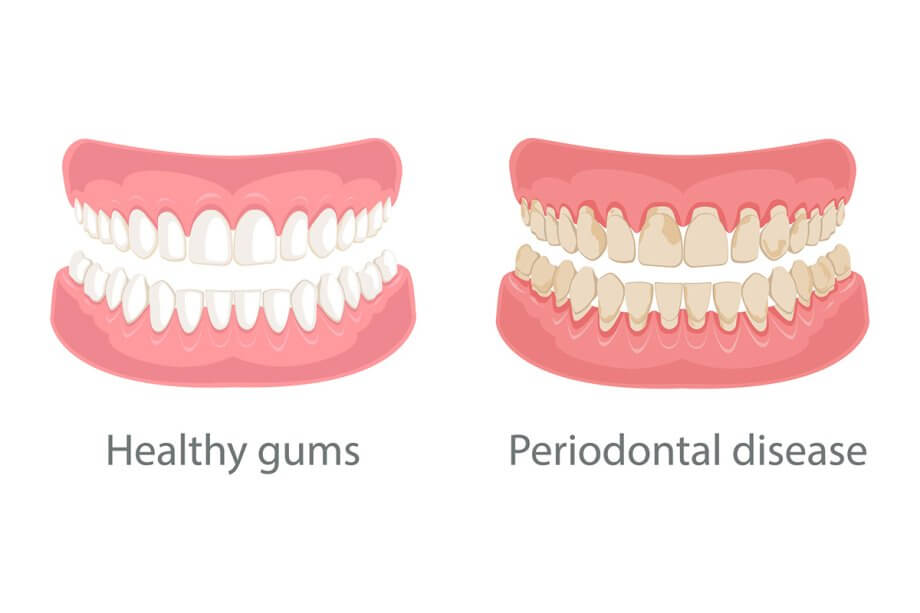Periodontal disease, more commonly known as gum disease, is an oral health condition affecting millions of Americans. Once it develops it can be difficult to eliminate, so the best course of action is prevention. However, gum disease can be treated and managed so that it doesn’t cause long term damage.
The best way to prevent periodontal disease is to understand what causes it. This allows you to develop healthy habits that can keep gum disease from taking hold.
What is Periodontal Disease?
Periodontal disease is a bacterial infection of the periodontal tissue, meaning your gums. When the bacteria that lives in your mouth infects the gum tissue, it results in gum disease.
Symptoms of Periodontal Disease
Common signs and symptoms of gum disease include:
- Red gum tissue
- Swollen gums
- Bleeding gums (you may notice blood in the sink when you brush your teeth)
- Abscesses (bumps on the gum tissue)
- Loose teeth (teeth may even become loose enough to fall out)
- Bad breath
The Primary Cause of Periodontal Disease
The primary cause of gum disease is bacteria. Plaque is a sticky film made up of food residue and bacteria that clings to the teeth. When it is not removed by brushing, flossing, and regular dental cleanings, plaque can harden into calculus and also work its way under your gums. The bacteria in calculus has reached a level of maturity that makes it more of a threat to your gum tissue, meaning it is more likely to cause an infection.
Other Contributing Factors
There are habits and certain health conditions that can increase your risk of developing periodontal disease. These include:
- High sugar diet. If you eat a high sugar diet you are likely to have a higher concentration of plaque on your teeth. Sugar feeds bacteria and helps them become overpopulated.
- Diabetes. If you have diabetes it typically means that your saliva contains a higher sugar content that can increase your risk of gum disease.
- Pregnancy. The hormonal changes that come with pregnancy can increase your chances of developing gum disease.
- Smoking. Smoking dries out your mouth and hinders circulation, making your gum tissue more susceptible to infection.
- Immune-deficiencies. Health conditions that compromise the immune system could make your body less able to fight infection, such as gum disease.
Preventing Gum Disease
Prevention is best when it comes to gum disease, because once it develops it can become a chronic condition. Here are the best ways to prevent gum disease:
- Good oral hygiene. The best thing you can do to prevent gum disease is brush your teeth twice a day and floss once a day. Take your time when brushing and make sure to reach all of your teeth, especially focusing on the gumline. It can help to mentally divide your mouth into 4 sections (upper right, upper left, lower right, lower left) and spend at least 30 seconds on each section for a total of 2 minutes.
- Regular dental cleanings. It is also important to go to the dentist for regular dental cleanings and oral examinations at least every 6 months. It can be difficult to remove all of the plaque from your teeth with brushing and flossing alone, so professional dental cleanings are crucial. Oral examinations also allow your dentist to detect gum disease in the early stages when it is easier to treat. Some times you will have more frequent cleaning when you have periodontal disease, in order to monitor and try to disrupt the bacteria before it hardens into calculus.
- Periodontal maintenance. If you have severe or recurring gum disease, periodontal maintenance may be necessary. This involves a deep cleaning of the teeth above and below the gum line to remove plaque and calculus. Periodontal maintenance typically requires more frequent cleaning appointments, such as once a month or every few months.
- Limit sugar intake. Try to reduce the amount of sugar you eat and drink. If you consume sugar, rinse your mouth out with water or brush your teeth afterwards.
- Quit smoking. If you smoke, it is always in your best interest to quit for a wide variety of health reasons, including gum disease.
Who Provides Periodontal Maintenance?
Periodontal maintenance is provided by a periodontist who specializes in the health of the support structures for the teeth, including the gums. Holzinger Periodontics & Dental Implants provides periodontal maintenance on a customized schedule to meet your specific needs. Gum disease can be treated and managed with the right periodontal care.
Contact us today to learn more and schedule an appointment.

